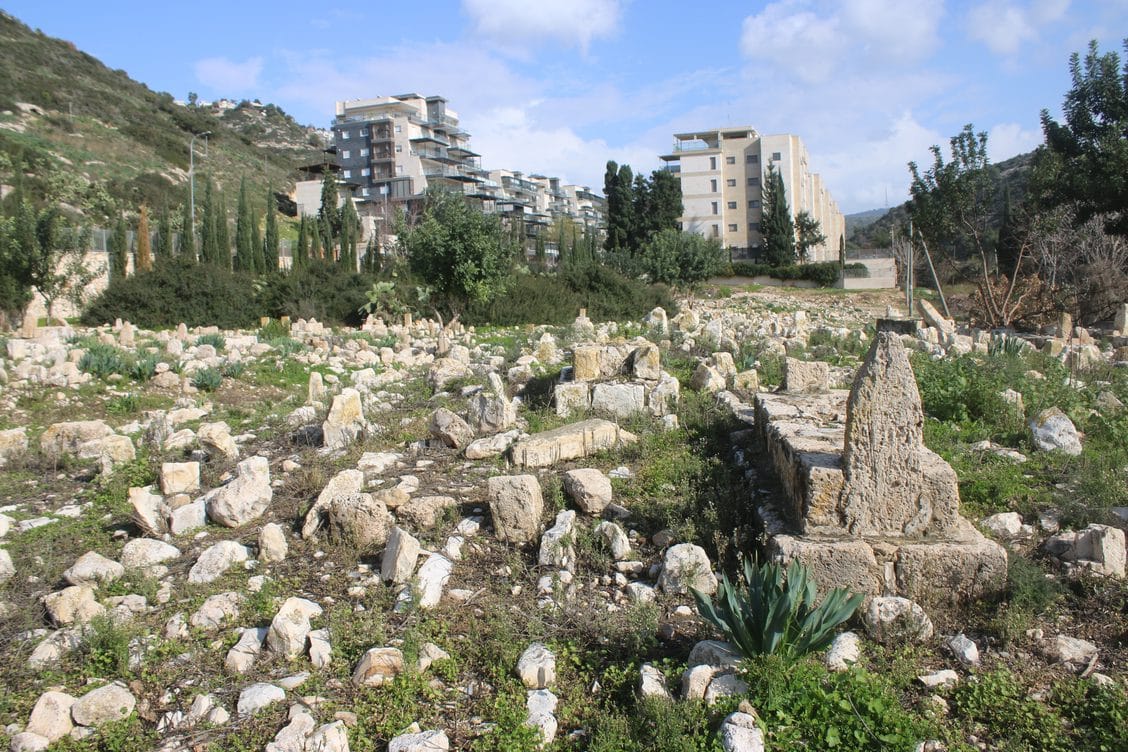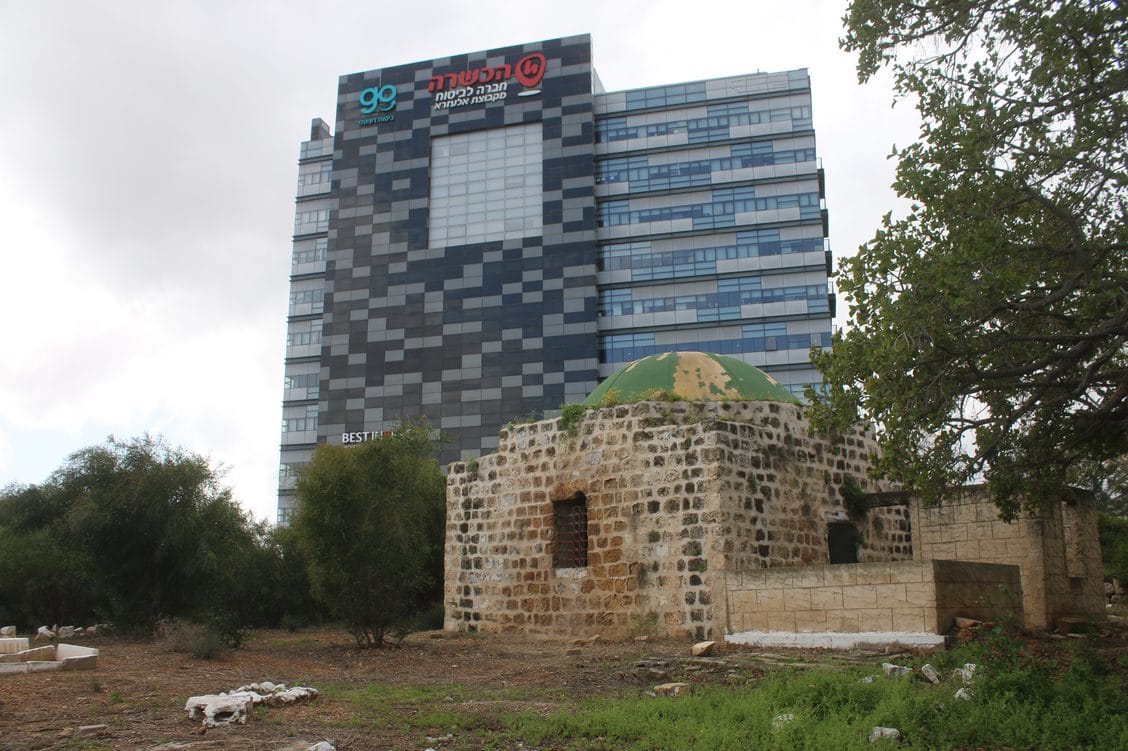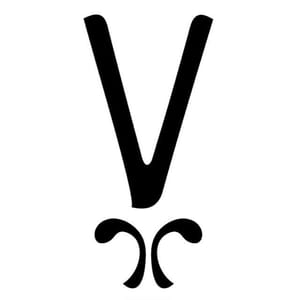
A few weeks ago, I joined a tour around the area of Tel Aviv University with about 25 Israelis. The point of the tour wasn’t to learn about the university itself, but rather the land on which the university had been built, and the history that has been erased from both the physical landscape and the Israeli public consciousness. The area now dominated by university departments and towering student dormitories was once the Palestinian village of al-Shaykh Muwannis, which was entirely depopulated in 1948. Only two original structures remain, and the village’s residents, who became refugees overnight, are still forbidden from returning.
Today, Israelis celebrate Yom HaAtzma’ut – Independence Day. Next week, Palestinians will mark the same series of events as Nakba Day, referring to the “catastrophe” that befell the residents of al-Shaykh Muwannis and more than 500 other villages like it. But within Jewish-Israeli society, activists are increasingly attempting to raise awareness about the Nakba and to put it at the centre of efforts to achieve a just peace in Israel-Palestine. One of the organizations at the forefront of these attempts is Zochrot, which organised the tour I took part in a few weeks ago.
I sat down with Yaara Benger Alaluf, Zochrot’s head of political education, to discuss the organisation’s work and what we in the diaspora can learn from it.
BR: Can you start by telling me a bit about Zochrot?
YBA: Zochrot is an NGO established exactly 20 years ago to make information about the Nakba available in Hebrew, and to encourage discussion around, and accountability for, the Nakba within Jewish-Israeli society. We do a lot of educational work: leading tours every month to different Palestinian villages that were depopulated in 1948, and offering resources and lectures, often taught by Palestinian scholars. In its second decade, Zochrot began advocating for the right of return of Palestinian refugees as a precondition for any just solution. In this way, Zochrot is performing a kind of pre-transitional justice, the first step of which requires simply acknowledging the historical truth.
BR: What is your role in the organisation?
YBA: As head of Zochrot’s education department, I work with teachers to build educational resources or lesson plans. Unlike Breaking the Silence [an organisation of former Israeli soldiers which collects and shares testimonies about the realities of serving in an occupying army], which is still invited to enter some schools to talk to students, Zochrot never had that privilege; talking about the Nakba is still considered taboo in most schools in Israel. Instead, we train teachers to deliver the education themselves in their classrooms in a sensitive and organic way.
We don't offer the answers – we just encourage people to ask questions. We're trying to create a political culture in which we trust people – whether they're 14 years old or 60 – to be given the facts that will enable them to look at the landscape differently. Once people start opening their eyes, there is not a lot else you need to do.
BR: One of the main tropes that we hear in our diaspora Jewish communities is that Palestinian children are taught to hate Jews in their textbooks. What are Israeli kids taught about Palestinians and the Nakba, if anything?
YBA: When it comes to the Zionist narrative, it's not a case of what Israelis are taught so much as what they aren’t taught. The story goes: there was antisemitism in eastern Europe, then the Holocaust happened, and the state of Israel was the ultimate solution. I don’t remember being taught that there is no such thing as Palestinians, or that they are inherently bad or antisemitic; on the contrary, I was taught that they're just people who made a mistake and started a war that they lost, whereas we were nice and friendly because we accepted the UN Partition Plan in 1947.
But you’re never taught about the internal discussions among Zionist leaders when Britain first proposed partition 10 years earlier. David Ben-Gurion and other Zionist leaders were saying explicitly that we should accept partition as a first step and then expel all of the Arabs except perhaps the predominantly Christian populations of Nazareth, Bethlehem, and the Old City of Jerusalem. When you understand this, it's clear that the dispossession and uprooting of Palestinians in 1948 was not a mistake or just something that happened during the war with no prior thought.
BR: How difficult is it to talk about the Nakba in Israeli society? And has it changed at all over the two decades that Zochrot has been active?
YBA: On the one hand, despite the “Nakba Law” that passed in 2011 [which threatens to withhold state funding from any organisation or public body that commemorates Nakba Day], the Nakba has become less of a taboo in Israeli society. Unlike 10 or 15 years ago, when high school students were totally ignorant, students today have a much richer terminology. But talking about the Nakba more doesn’t mean students reach critical conclusions. I meet students who will openly admit that Zionism is a colonial project, and that the Nakba constituted ethnic cleansing, but they will also argue that there was no other choice, or that “they would do the same to us.” To me, that's an even scarier perspective.
One thing I still notice is that a lot of Israelis think that what we mean by “the Nakba” is just the sorrow that Palestinians feel because they lost a war. But it’s not about that, so I always try to explain what it actually means. When you spell it out for people – that over 80% of those who were living in the land that became the state of Israel suddenly became refugees in 1948 – they can’t ignore the numbers. And when you talk about the people who were displaced, you can also start talking about solutions.

BR: Tell me about Zochrot’s new educational resource, “Shuruch – Cracks in Literature.”
YBA: When Zochrot started developing educational resources, we produced one comprehensive study guide called “How Do We Say Nakba in Hebrew?” which is basically a whole year’s worth of lesson plans. It contains some really useful methods, but the fact is that no teacher can dedicate more than about 10 minutes to the Nakba because there is such limited scope for deviating from the official curriculum. That's why we switched to the concept of “Shuruch” (“Cracks” in Arabic), which is to try to locate places within the Education Ministry’s official curriculum where a teacher could insert some critical facts or questions.
We started with “Cracks in History” a few years ago, which is a supplement to the 11th-grade history syllabus in which students learn about the establishment of the state of Israel. We decided to do the same thing with other disciplines, so we’ve just released “Cracks in Literature” which offers lesson plans for 22 different literary works by both Palestinians and Jewish-Israelis. It not only gives voice to Palestinian authors and protagonists, but also allows teachers to bring questions into the classroom that are usually not present, just by reading a poem or a story.
BR: Which is your favourite text in the book?
YBA: There is a poem by Nathan Wasserman, in which he talks about walking around Kiryat Yovel [a neighborhood in southwest Jerusalem] with his children. He sees a mother and her children harvesting some olive trees, and he’s afraid because he doesn't know who they are or why they’re there.
I grew up like that, in an Israeli village built on top of a Palestinian village. I only understood when I was 30 years old that, as a child, I was playing in a graveyard of people whose relatives are still alive but unable to visit, surrounded by fig trees that they planted. No one ever asked where the trees came from, even though it was clear that someone had planted them and taken care of them. A few times per year, people would appear from the hills with donkeys to take the fruits, and then disappear again. They knew exactly what to do with the trees and the plants, which really made me feel like a stranger in the land. I was playing in these fields without knowing what these plants were, or how to harvest them.
Wasserman’s poem raises all kinds of questions for the reader: Who are these people? What is their relationship to the trees? The teachers can ask their students to Google “Kiryat Yovel,” and they suddenly realise – because it's written on Wikipedia – that it used to be a Palestinian village, and this mother and her children probably used to live in the village; these are their lands, and that’s why they know how to get there and harvest the olives. It reminds us that the Palestinian refugees didn’t disappear – they are still here. And what are Israelis afraid of? It's just a mother and her children collecting olives. So these are the kinds of pedagogical processes that the book enables.
BR: Can you tell me more about your own journey towards recognising the Nakba?
YBA: I wasn’t born in Israel; after immigrating with my family we lived in a suburb of Jerusalem called Mevaseret Zion, which is built on the ruins of the Palestinian village of Qalunya. And for a long time, I didn't know anything. My parents were socialists and anti-imperialists in Latin America, so I was raised in a house that was very leftist but also very Zionist. I guess I felt some kind of turmoil: I knew there were problems with the story I was being told, but I didn’t know how to resolve them.
Things started changing when I went to write my PhD in Germany, which was actually the first time I met Palestinian refugees – I guess I met Palestinian refugees all my life, but I didn't acknowledge that they were refugees. I would ask people where they’re from, and they would reply, for example, “Yafa” (Jaffa), even though they were born in Jordan, and I realised that they were talking about where their grandparents were from. And I became friends with them; we studied together, and went to the same parties and festivals. Then the pieces started to fall down, and I began to ask myself: How come my parents could immigrate to Israel whenever they wanted but Majed’s parents, who actually had something to do with this land, are not allowed to return? Suddenly, the fear I once felt just started melting away.
One day, I walked into a square in Berlin and saw Palestinian flags. As I approached, I noticed that it was a kind of festival: there were families and children, people were dancing, and there were food vendors. There was a giant map of Palestine on the ground, and some old people were placing sticky notes in different places on the map to show the names of their villages. I didn't speak Arabic back then, but I understood that they were telling stories. I called another Israeli friend: “You have to come, there is something crazy here!” We spent the whole day there, but it took me a while to realise that it was May 15 – Nakba Day.
To be a fly on the wall there was like stepping out of the matrix – I was seeing something that my Zionist education didn't want me to see. There was nothing to fear – just families talking about their villages. The map stated that all the information was provided by Zochrot, which I thought was strange because that’s a Hebrew word. I Googled “Zochrot,” and I’ve been connected to the organisation ever since.
BR: Obviously your work is focused on Israeli society, but so many of us in the diaspora grew up celebrating nationalist Israeli holidays like Yom HaAtzma’ut in our synagogues, our Jewish schools, and our youth movements. What advice do you have for challenging the hegemonic Zionism in our own communities?
YBA: I try to explain to my family abroad that donating to the Jewish National Fund and the Jewish Agency [two Israeli quasi-governmental bodies] actually undermines the very notion of democracy for me as a citizen – and that’s before we even talk about the Palestinians. I wish diaspora Jews would play a greater role in exposing the colonial nature of Zionism and demanding a just solution in Israel-Palestine. That includes explaining how Zionism and the state of Israel actually endanger Jewish life and Jewish communities abroad.
In the same sense, when I advocate for the right of Palestinian refugees to return to their land, I don't see it as something purely altruistic: I do it because, without it, I don't think there can be a better, more peaceful future here for me and my children. And even if there is peace, I don't want to live in a place that allows my family to visit whenever they want but prevents my neighbour in Jaffa from celebrating holidays with her family. That doesn't mean that my family has to return to somewhere else; there are solutions that can work for everyone.
Ben Reiff is an editor at Vashti.
Author

Ben Reiff is an editor +972 Magazine and Vashti.
Sign up for The Pickle and New, From Vashti.
Stay up to date with Vashti.



